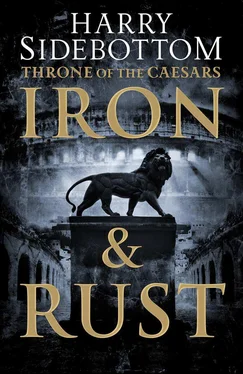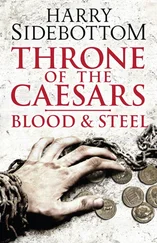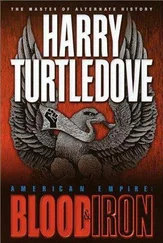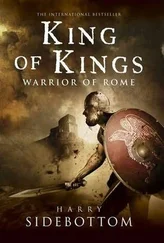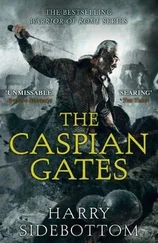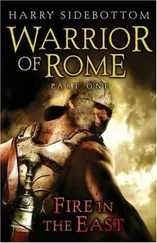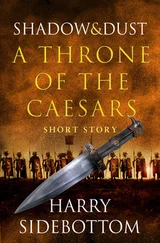Harry Sidebottom - Iron and Rust
Здесь есть возможность читать онлайн «Harry Sidebottom - Iron and Rust» — ознакомительный отрывок электронной книги совершенно бесплатно, а после прочтения отрывка купить полную версию. В некоторых случаях можно слушать аудио, скачать через торрент в формате fb2 и присутствует краткое содержание. Год выпуска: 2014, Издательство: HarperCollins Publishers, Жанр: Исторические приключения, на английском языке. Описание произведения, (предисловие) а так же отзывы посетителей доступны на портале библиотеки ЛибКат.
- Название:Iron and Rust
- Автор:
- Издательство:HarperCollins Publishers
- Жанр:
- Год:2014
- ISBN:нет данных
- Рейтинг книги:4 / 5. Голосов: 1
-
Избранное:Добавить в избранное
- Отзывы:
-
Ваша оценка:
- 80
- 1
- 2
- 3
- 4
- 5
Iron and Rust: краткое содержание, описание и аннотация
Предлагаем к чтению аннотацию, описание, краткое содержание или предисловие (зависит от того, что написал сам автор книги «Iron and Rust»). Если вы не нашли необходимую информацию о книге — напишите в комментариях, мы постараемся отыскать её.
Iron and Rust — читать онлайн ознакомительный отрывок
Ниже представлен текст книги, разбитый по страницам. Система сохранения места последней прочитанной страницы, позволяет с удобством читать онлайн бесплатно книгу «Iron and Rust», без необходимости каждый раз заново искать на чём Вы остановились. Поставьте закладку, и сможете в любой момент перейти на страницу, на которой закончили чтение.
Интервал:
Закладка:
The third man who had dealt with the logistics now sat on the throne of the Caesars. In the East, Timesitheus had met Maximinus only once, and they had exchanged no words in a crowded council. But what he had learnt of the Thracian’s actions spoke of reasonable efficiency and complete, even priggish probity. Yet when, back in Rome, this campaign against the Germans became an inevitability, Alexander’s mother and senatorial councillors had decided that Timesitheus alone would handle all issues of supply. The role of Domitius had been cut back to digging ditches and mucking out stables. Maximinus had been assigned the role of training recruits. Timesitheus had interpreted that as a demotion. Now, he hoped the big Thracian had not seen it the same way.
The Senators of the standing inner council were grouped to the left of the throne. Seeing them in a group was never pleasing. They appeared to have been selected on grounds of advanced age and evident venality. Also, Timesitheus thought, they shared ill-favoured looks as a common possession. Petronius Magnus had the bulging eyes of some crustacean adapted to dim light. With his long, artful hair, Catilius Severus resembled an eastern priest, one of the scum who dance along the roads begging for coppers, clashing their cymbals and shaking their arses. The enormously fat Claudius Venacus seemed to have been dipped in something viscous. The other thirteen were hardly more aesthetic.
‘Let in the rest,’ Maximinus said.
Timesitheus followed Priscillianus to the opposite side from the sixteen Senators. This was too near Domitius for his liking. Timesitheus could feel the eyes of the Prefect of the Camp on him.
The others entered. Most, especially the Senators, tried not to push and shove, tried to preserve their dignitas . It was not easy. Too many men were trying to get in at once. Senators and equestrians, those holding commands and magistracies and those without, jumbled together. All wanted to get to the front, catch the eye of the new Emperor.
It had to be deliberate. Sanctus had been ab Admissionibus for years. Not a bad ploy, Timesitheus thought. Let them in at once, and have them demonstrate their own inferiority by scrabbling to get near you. Much more likely the hand of Flavius Vopiscus was at work than that of his putative ruler.
Sabinus Modestus struggled through the throng, grinning in a slack-jawed way. Timesitheus thought that, while his cousin might not be over-intelligent, at least he was good with his elbows and commendably loyal. Although, on second thoughts, it might be that Modestus had failed to realize the precarious nature of Timesitheus’ position.
Maximinus had sat serene apart from the scrum. Now, he got to his feet. His vast, powerful bulk dominated the space. There was a scabbard in his hand. With a practised, fluid motion, he drew his blade. While one or two of the other eminent Senators flinched a little, the bovine Claudius Venacus almost stumbled backwards.
Reversing the weapon, Maximinus held the hilt to Anullinus. ‘As my Praetorian Prefect, take this sword. If I reign well, use it on my behalf. If I reign badly, turn it against me.’
Anullinus took it, and the council applauded.
That either was brave or very foolish, Timesitheus thought. Had Maximinus not considered the fate of Alexander? Timesitheus was certain he would be in no such hurry to entrust his own survival to a judgement of his virtues carried out without advice by an ignorant, treacherous murderer like Anullinus.
Maximinus sat down, and indicated for Flavius Vopiscus to speak.
Timesitheus arranged his face. No trace of amusement, as he watched Vopiscus’ hand come up without volition and, through the folds of his toga, finger the amulet hidden at his breast.
‘A dispatch has arrived from Rome.’ The voice of Vopiscus was melodious, trained. ‘The Conscript Fathers have passed a decree awarding Gaius Iulius Verus Maximinus all the powers held by previous Emperors. Their joy was unconfined. Their acclamations lasted for three and a half hours.’
More applause.
Was it a bulla ? Did Vopiscus still wear the little model of a phallus designed to keep him safe as a child? Or was it something else — an Egyptian scarab, a piece of amber, a sculpted vulva?
‘Rome is secure and quiet. The incumbent Consuls Ordinarius have been told that their tenure will not be shortened. Of course, the virtues of certain men demand reward. Space must be found among the Suffect Consuls for Caius Catius Clemens, Marcus Clodius Pupienus Maximus and Lucius Flavius Honoratus, most likely others. But Honoratus himself has assured those already designated that their time in office will be little curtailed, and future preferment will be shown them.’
Vopiscus’ hand still toyed with the hidden object. The Emperor Augustus had worn a seal-skin amulet. This could be something altogether different: a fingernail or some small, desiccated body part of a drowned man.
‘Our most gentle and unassuming Emperor Maximinus has no desire to deprive other men of their honours. In his magnanimity and modesty, he has decided not to hold a Consulship until next year. Then he will enter into office on the kalends of January with Marcus Pupienus Africanus as his colleague.’
Maximinus himself interrupted. ‘I do not want to forget the sons of the commanders of my youth here in the North. The following year, Lucius Marius Perpetuus will be one of the Consuls Ordinarius. And Pontius Proculus Pontianus the year after that.’
Now that was ill-advised, Timesitheus thought. Although, these days, the role was almost entirely ceremonial, to be Consul, especially to be one of the two after which the year was named, was still the life ambition of many Senators. The nobiles regarded the office as a birthright, and others wanted to join them. To begin to allocate the position years in advance was sure to alienate a large number in the Curia.
‘Your piety does you credit, Caesar.’
Was there something else in Vopiscus’ tone, something implying that the words of Maximinus said less commendable things about other aspects of the new Emperor’s character? Vopiscus was not to be under-rated. There was an asperity beneath the daemon-ridden exterior of the Senator.
‘Since the death of Ulpian, no one can claim greater eminence in the field of law than his pupil Herennius Modestinus. The greatest jurist of his generation must stand by the Emperor advising him as his a Libellis . The new Secretary for Petitions is on his way north. His previous post as Prefect of the Watch has been granted to Quintus Potens.’
Like the tumblers and levers of a well-made lock, the pieces shifted together in Timesitheus’ mind. It had been neatly done. A Consulship for each of his sons, the younger as colleague of the new Emperor next year, had bought Pupienus, the Prefect of the City, and with him had come the six thousand men of the Urban Cohorts. The offer of the most important legal post in the empire had eased Herennius Modestinus out of Rome. His command of the seven thousand vigiles had been given to a man well linked to the new regime. Potens had been Prefect of the Parthian cavalry here with the field army. His brother-in-law was Decius, the governor of Hispania Tarraconensis. Decius was from a family which, time out of mind, had held wide estates across the Danubian lands. These stretched into Maximinus’ native Thrace, and Decius himself had been an early patron of the Thracian trooper’s career. With the vast majority of the Praetorians here on the Rhine, all the soldiers that mattered in the eternal city were in the hands of Maximinus’ men. Vopiscus might be riddled with superstition, but he and the urbane Honoratus had seized control of Rome with admirable skill.
Читать дальшеИнтервал:
Закладка:
Похожие книги на «Iron and Rust»
Представляем Вашему вниманию похожие книги на «Iron and Rust» списком для выбора. Мы отобрали схожую по названию и смыслу литературу в надежде предоставить читателям больше вариантов отыскать новые, интересные, ещё непрочитанные произведения.
Обсуждение, отзывы о книге «Iron and Rust» и просто собственные мнения читателей. Оставьте ваши комментарии, напишите, что Вы думаете о произведении, его смысле или главных героях. Укажите что конкретно понравилось, а что нет, и почему Вы так считаете.
